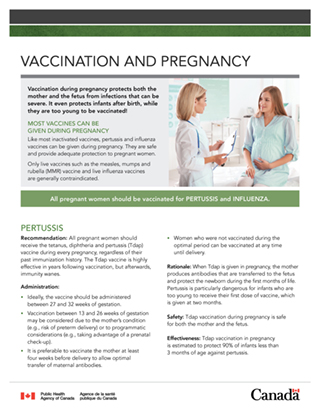Vaccination and pregnancy (fact sheet)

Download the alternative format
(PDF format, 266 KB, 2 pages)
Organization: Public Health Agency of Canada
Date published: October 2019
Vaccination during pregnancy protects both the mother and the fetus from infections that can be severe. It even protects infants after birth, while they are too young to be vaccinated!
Most vaccines can be given during pregnancy
Like most inactivated vaccines, pertussis and influenza vaccines can be given during pregnancy. They are safe and provide adequate protection to pregnant women.
Only live vaccines such as the measles, mumps and rubella (MMR) vaccine and live influenza vaccines are generally contraindicated.
All pregnant women should be vaccinated for pertussis and influenza.
Pertussis
Recommendation
All pregnant women should receive the tetanus, diphtheria and pertussis (Tdap) vaccine during every pregnancy, regardless of their past immunization history. The Tdap vaccine is highly effective in years following vaccination, but afterwards, immunity wanes.
Administration
- Ideally, the vaccine should be administered between 27 and 32 weeks of gestation.
- Vaccination between 13 and 26 weeks of gestation may be considered due to the mother’s condition (e.g., risk of preterm delivery) or to programmatic considerations (e.g., taking advantage of a prenatal check-up).
- It is preferable to vaccinate the mother at least 4 weeks before delivery to allow optimal transfer of maternal antibodies.
- Women who were not vaccinated during the optimal period can be vaccinated at any time until delivery.
Rationale
When Tdap is given in pregnancy, the mother produces antibodies that are transferred to the fetus and protect the newborn during the first months of life. Pertussis is particularly dangerous for infants who are too young to receive their first dose of vaccine, which is given at 2 months.
Safety
Tdap vaccination during pregnancy is safe for both the mother and the fetus.
Effectiveness
Tdap vaccination in pregnancy is estimated to protect 90% of infants less than 3 months of age against pertussis.
Influenza
Recommendation
All pregnant women should receive the inactivated influenza vaccine during each pregnancy.
Rationale
Pregnant women are at higher risk of developing complications such as pneumonia if they get influenza. Moreover, influenza during pregnancy increases the risk of preterm delivery and low birth weight.
Safety
Administration of an inactivated influenza vaccine during pregnancy is safe for both the mother and the fetus.
Effectiveness
Although influenza vaccine effectiveness can vary from season to season, vaccination continues to be the best available way to prevent influenza infection and its complications. Vaccination can also reduce symptom severity, and the risk of hospitalization and death.
Vaccine recommended in post-partum
Rubella
Recommendation
The best time to receive the measles, mumps and rubella (MMR) vaccine is prior to pregnancy. Pregnant women without documented evidence of previous rubella vaccination (e.g., immunization record) should be tested for rubella antibodies. Those who are not immune should receive the MMR vaccine after delivery and prior to hospital discharge.
Rationale
Rubella virus infection in pregnancy can result in miscarriage, stillbirth or a series of fetal malformations referred to as “congenital rubella syndrome” (CRS).
Safety
The measles, mumps and rubella (MMR) vaccine is generally contraindicated during pregnancy because it is a live vaccine. Vaccination may be considered in certain circumstances where benefits may be greater than risks (e.g., during a rubella outbreak).
Effectiveness
Rubella vaccines are at least 94% effective.
Other vaccines
Other vaccines may be recommended to mothers in certain high-risk circumstances: following exposure, during an outbreak, before travelling to an endemic area, or when indicated due to her health condition.
These recommendations are based on the Canadian Immunization Guide. Health care providers should also consult their province or territory’s vaccination protocols.
For more information, consult the Canadian Immunization Guide.